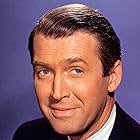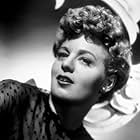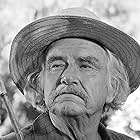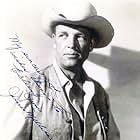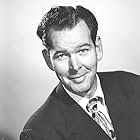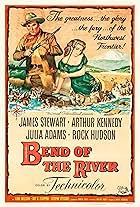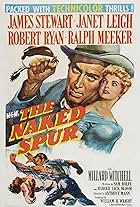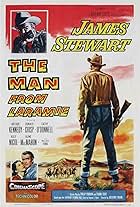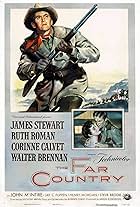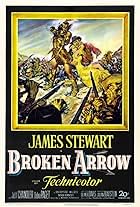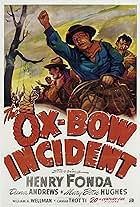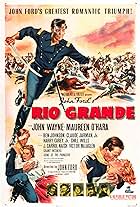AVALIAÇÃO DA IMDb
7,6/10
23 mil
SUA AVALIAÇÃO
A obsessão de um vaqueiro por um fuzil roubado o leva numa odisseia cheia de balas através do oeste americano.A obsessão de um vaqueiro por um fuzil roubado o leva numa odisseia cheia de balas através do oeste americano.A obsessão de um vaqueiro por um fuzil roubado o leva numa odisseia cheia de balas através do oeste americano.
- Prêmios
- 1 vitória e 1 indicação no total
Stephen McNally
- Dutch Henry Brown
- (as Stephen Mc.Nally/Stephen McNally)
Tony Curtis
- Doan
- (as Anthony Curtis)
Victor Adamson
- Townsman
- (não creditado)
Robert Anderson
- Basset
- (não creditado)
- Direção
- Roteiristas
- Elenco e equipe completos
- Produção, bilheteria e muito mais no IMDbPro
Enredo
Você sabia?
- CuriosidadesJames Stewart credited this film with saving and redefining his career after a series of postwar flops threatened to seriously damage it.
- Erros de gravaçãoThis movie is based on a rifle-shooting competition held in Dodge City on 4 July 1876. During a poker game in the movie, Dutch refers to a "Dead Man's Hand". This refers to the poker hand 'Wild Bill' Hickok was holding when he was shot in the back by Jack McCall on 2 August 1876 - less than a month later. It was too soon for the "Dead Man's Hand" to be a famous phrase. However, per IMDb guidelines for Anachronisms, "a good deal of leeway" is allowed; linguistic anachronisms are usually excused (modern words in historical films) - "always bear in mind that it's entertainment not documentary."
- Citações
Wyatt Earp: That's Dutch Henry Brown. I thought you said you didn't know him.
Lin McAdam: I said I didn't recall the name.
- Cenas durante ou pós-créditosThe film's opening prologue states: This is a story of the Winchester Rifle Model 1873 "The gun that won the West" To cowman, outlaw, peace officer or soldier, the Winchester '73 was a treasured possession. An Indian would sell his soul to own one . . .
- ConexõesFeatured in MacArthur, O General Rebelde (1977)
Avaliação em destaque
One of the great Westerns, Winchester '73 is noteworthy film in many respects, not least because it marked the start of one of the great creative partnerships in the genre, that between director Anthony Mann and James Stewart. Mann had until this time been working successful in low budget films, crafting a series of B-noirs, which have a following on their own account today: titles such as T-Men (1947), Border Incident (1949) and Raw Deal (1948). 1950 brought his first big assignment with the current production, a film which many critics point to as marking the western's emergence into maturity during the decade.
It was also something of a career change for Stewart, whose many roles during his early career had been based around a friendly and frequently homespun persona. Only such films as the documentary noir Call Northside 777, of two years earlier, or odd moments during It's A Wonderful Life hinted at something darker, almost pathological, lurking beneath the amiable exterior. The series of Westerns made with Mann brought this something else to the surface; suddenly this was a dogged, vengeful Stewart, still playing honest men, but men who had often suffered a great wrong and were driven to put things right. (Hitchcock recognised this neurotic dimension to the actor as during the same period he also used him to great effect). Thus in The Man From Laramie (1955) the hero would have his livelihood burnt and be dragged behind a horse by a psychotic, while in Bend Of The River (1952) he is cast out to survive on his own from a wagon train.
As Lin McAdam in Winchester '73 he is already hunting someone who has wronged him: "...chasing him since I can't remember" and then, to add to it all, has a prize rifle stolen from him by his prey after an intense competition. The film focuses on the eponymous weapon as it passes through various hands and Stewart's parallel tracking of his human prey. In some ways his dogged perseverance reminds one of Ethan Edwards' in The Searchers (1956), where obsessive behaviour by a man searching for answers for matters as much internal as external also drives the plot.
McAdam's single-mindedness is a characteristic of many of Mann's Western heroes, a state of mind that approaches the unbalanced in The Naked Spur (1953). Of course McAdam is after getting back his rifle almost as much as he is after vengeance. Later films also feature the wandering weapon storyline - such as American Gun, or The Gun (1974) - the tale of a firearm passing through various hands provides a morality tale hedged around the prevalence of armaments. Winchester '73's central narrative thread has an entirely different purpose, one not generally concerned with social comment. When McAdam's gun is stolen the loss is seen in far more private, almost psychological terms, as if a piece of his personal honour is taken along with the rifle. In fact honour plays a large part in this film: it is either symbolically removed, as in the case of Dutch Henry Brown's early theft; much reduced as shown in the cowardice and subsequent humiliation of Charles Drake; or largely absent, as with the trader selling arms of questionable worth to the warring Indians. And of course besides McAdam's fury at the opening theft, what also drives him on is the dishonourable (because he's shot in the back by someone he trusted) loss of his father.
As critics such as Phil Hardy have noted, during the film McAdam encounters a series of potent father figures, such as Wyatt Earp, Sergeant Wilkes, and Lamont - the presence of who serves to echo and reinforce his own loss. To prove himself worthy of his late father in his own eyes, McAdams has to do is secure the something special he has lost and exact suitable vengeance. The look of the exhausted McAdam's face at the close of the film as he rejoins Lola (Shelley Winters) and his sidekick High Spade (Millard Mitchell) says it all.
In making Winchester '73, Mann was at last given the chance and the budget to make the most of his talents. His previous films had mostly been set amongst cramped and dangerous urban environments. Settling into a new genre he at once showed great response to landscape, and not just in the epic moments like the Indians' attack on Sergeant Wilkes' party. In many of his Westerns it is noticeable that the territory through which characters move is not just the geography of the west but also often a physical echo of the ongoing human drama, as exteriors reflect the emotional state of his characters. Thus at the start of the film we see McAdam moving through open vistas, before his first encounter set amidst the excited human clutter of Dodge. As events proceed, the landscape becomes more and more inhospitable until the film's climax fought out around and amidst bare rocks - a claustrophobic and harsh environment, aptly trapping the two adversaries in their uncompromising duel. Many traditional Westerns tended to save the psychological drama for interiors and the action, taken plain and simple, for outside. Mann's achievement was to resolve this pattern into something more subtle and expressive, opening the way for the deeper resonances in the genre which were to follow.
Winchester '73's plot, which involves several locations and a range of characters and events, could easily have proved episodic. Mann manages to draw all these elements together into a satisfying unity while still allowing the supporting actors to shine and do their thing. One standout is Dan Duryea, in an entirely characteristic performance as Waco Johnny Dean. Dean and Dutch Henry Brown (excellently done by the underrated Stephen McNally) provide excellent turns in villainy. There's a nice touch of symmetry too as the end draws near: McAdam, who had earlier been humiliated by Brown over a drink of milk back in Dodge, faces down Dean over another drink in the cantina.
The excellent DVD transfer shows the film in its best light, not least the splendid black and white photography. Mann rarely moves his camera, but instead shows mastery of composition within the frame and his direction of actors. The depth of focus benefits from the clear digital image, reproduced in the correct academy ratio. If this isn't enough to wet the appetite of any western fan, then there is an unmissable bonus. James Stewart recorded an interview commentary for the title when it appeared on laserdisc years back, and this is included - perhaps one of the very rare occasions that a representative of Hollywood's golden age appears in this way on a western DVD. (I can only otherwise think of Maureen O'Hara's commentary to the Region 1 special edition of Rio Grande.)
It was also something of a career change for Stewart, whose many roles during his early career had been based around a friendly and frequently homespun persona. Only such films as the documentary noir Call Northside 777, of two years earlier, or odd moments during It's A Wonderful Life hinted at something darker, almost pathological, lurking beneath the amiable exterior. The series of Westerns made with Mann brought this something else to the surface; suddenly this was a dogged, vengeful Stewart, still playing honest men, but men who had often suffered a great wrong and were driven to put things right. (Hitchcock recognised this neurotic dimension to the actor as during the same period he also used him to great effect). Thus in The Man From Laramie (1955) the hero would have his livelihood burnt and be dragged behind a horse by a psychotic, while in Bend Of The River (1952) he is cast out to survive on his own from a wagon train.
As Lin McAdam in Winchester '73 he is already hunting someone who has wronged him: "...chasing him since I can't remember" and then, to add to it all, has a prize rifle stolen from him by his prey after an intense competition. The film focuses on the eponymous weapon as it passes through various hands and Stewart's parallel tracking of his human prey. In some ways his dogged perseverance reminds one of Ethan Edwards' in The Searchers (1956), where obsessive behaviour by a man searching for answers for matters as much internal as external also drives the plot.
McAdam's single-mindedness is a characteristic of many of Mann's Western heroes, a state of mind that approaches the unbalanced in The Naked Spur (1953). Of course McAdam is after getting back his rifle almost as much as he is after vengeance. Later films also feature the wandering weapon storyline - such as American Gun, or The Gun (1974) - the tale of a firearm passing through various hands provides a morality tale hedged around the prevalence of armaments. Winchester '73's central narrative thread has an entirely different purpose, one not generally concerned with social comment. When McAdam's gun is stolen the loss is seen in far more private, almost psychological terms, as if a piece of his personal honour is taken along with the rifle. In fact honour plays a large part in this film: it is either symbolically removed, as in the case of Dutch Henry Brown's early theft; much reduced as shown in the cowardice and subsequent humiliation of Charles Drake; or largely absent, as with the trader selling arms of questionable worth to the warring Indians. And of course besides McAdam's fury at the opening theft, what also drives him on is the dishonourable (because he's shot in the back by someone he trusted) loss of his father.
As critics such as Phil Hardy have noted, during the film McAdam encounters a series of potent father figures, such as Wyatt Earp, Sergeant Wilkes, and Lamont - the presence of who serves to echo and reinforce his own loss. To prove himself worthy of his late father in his own eyes, McAdams has to do is secure the something special he has lost and exact suitable vengeance. The look of the exhausted McAdam's face at the close of the film as he rejoins Lola (Shelley Winters) and his sidekick High Spade (Millard Mitchell) says it all.
In making Winchester '73, Mann was at last given the chance and the budget to make the most of his talents. His previous films had mostly been set amongst cramped and dangerous urban environments. Settling into a new genre he at once showed great response to landscape, and not just in the epic moments like the Indians' attack on Sergeant Wilkes' party. In many of his Westerns it is noticeable that the territory through which characters move is not just the geography of the west but also often a physical echo of the ongoing human drama, as exteriors reflect the emotional state of his characters. Thus at the start of the film we see McAdam moving through open vistas, before his first encounter set amidst the excited human clutter of Dodge. As events proceed, the landscape becomes more and more inhospitable until the film's climax fought out around and amidst bare rocks - a claustrophobic and harsh environment, aptly trapping the two adversaries in their uncompromising duel. Many traditional Westerns tended to save the psychological drama for interiors and the action, taken plain and simple, for outside. Mann's achievement was to resolve this pattern into something more subtle and expressive, opening the way for the deeper resonances in the genre which were to follow.
Winchester '73's plot, which involves several locations and a range of characters and events, could easily have proved episodic. Mann manages to draw all these elements together into a satisfying unity while still allowing the supporting actors to shine and do their thing. One standout is Dan Duryea, in an entirely characteristic performance as Waco Johnny Dean. Dean and Dutch Henry Brown (excellently done by the underrated Stephen McNally) provide excellent turns in villainy. There's a nice touch of symmetry too as the end draws near: McAdam, who had earlier been humiliated by Brown over a drink of milk back in Dodge, faces down Dean over another drink in the cantina.
The excellent DVD transfer shows the film in its best light, not least the splendid black and white photography. Mann rarely moves his camera, but instead shows mastery of composition within the frame and his direction of actors. The depth of focus benefits from the clear digital image, reproduced in the correct academy ratio. If this isn't enough to wet the appetite of any western fan, then there is an unmissable bonus. James Stewart recorded an interview commentary for the title when it appeared on laserdisc years back, and this is included - perhaps one of the very rare occasions that a representative of Hollywood's golden age appears in this way on a western DVD. (I can only otherwise think of Maureen O'Hara's commentary to the Region 1 special edition of Rio Grande.)
- FilmFlaneur
- 27 de set. de 2004
- Link permanente
Principais escolhas
Faça login para avaliar e ver a lista de recomendações personalizadas
- How long is Winchester '73?Fornecido pela Alexa
Detalhes
- Data de lançamento
- País de origem
- Central de atendimento oficial
- Idioma
- Também conhecido como
- Montana Winchester
- Locações de filme
- Empresa de produção
- Consulte mais créditos da empresa na IMDbPro
- Tempo de duração1 hora 32 minutos
- Cor
- Proporção
- 1.37 : 1
Contribua para esta página
Sugerir uma alteração ou adicionar conteúdo ausente

Principal brecha
By what name was Winchester '73 (1950) officially released in India in English?
Responda









